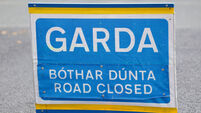Disability allowance appeals surge as thousands of rejected applications later approved

Aontú Leaer Peadar Tóibín TD at Leinster House. Picture: SAM BOAL/Collins Photos
Disability payment applications are being rejected at a "savage scale", with at least a quarter of rejected cases subsequently granted on appeal in the last 13 years.
Since 2015, some 144,649 applications have been rejected for payments, but 37,639 of those were overturned on appeal, figures released to Áontú's Peadar Tóibín show.











